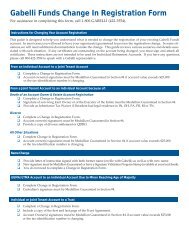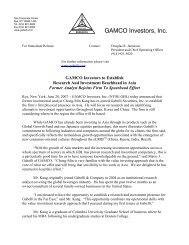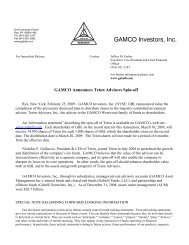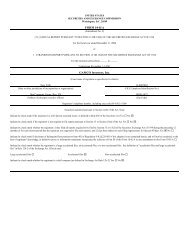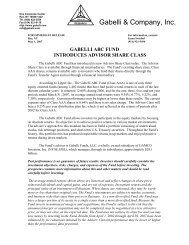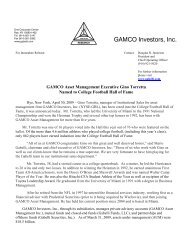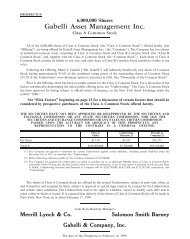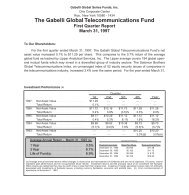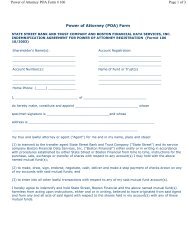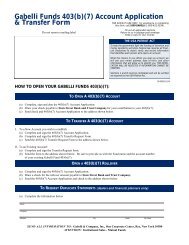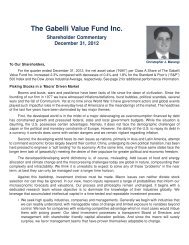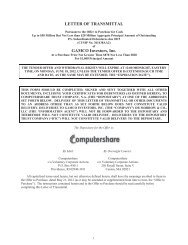Statement of Additional Info - Gabelli
Statement of Additional Info - Gabelli
Statement of Additional Info - Gabelli
You also want an ePaper? Increase the reach of your titles
YUMPU automatically turns print PDFs into web optimized ePapers that Google loves.
negotiated by the countries with which they trade. These economies also have been, and may continue to be, adversely<br />
affected by economic conditions in the countries with which they trade.<br />
Investing in emerging market countries may entail purchasing securities issued by or on behalf <strong>of</strong> entities that are<br />
insolvent, bankrupt, in default or otherwise engaged in an attempt to reorganize or reschedule their obligations, and in<br />
entities that have little or no proven credit rating or credit history. In any such case, the issuer’s poor or deteriorating<br />
financial condition may increase the likelihood that the investing fund will experience losses or diminution in available<br />
gains due to bankruptcy, insolvency or fraud.<br />
Zero Coupon and Payment In Kind Securities (the Mid-Cap Equity Fund, the Balanced Fund, and the<br />
Intermediate Bond Fund). A Fund may invest in zero coupon bonds, deferred interest bonds, and bonds on which the<br />
interest is payable in kind ("PIK securities"). Zero coupon and deferred interest bonds are debt obligations which are<br />
issued at a significant discount from face value. The discount approximates the total amount <strong>of</strong> interest the bonds will<br />
accrue and compound over the period until maturity or the first interest accrual date at a rate <strong>of</strong> interest reflecting the<br />
market rate <strong>of</strong> the security at the time <strong>of</strong> issuance. While zero coupon bonds do not require the periodic payment <strong>of</strong><br />
interest, deferred interest bonds provide for a period <strong>of</strong> delay before the regular payment <strong>of</strong> interest begins. Although this<br />
period <strong>of</strong> delay is different for each deferred interest bond, a typical period is approximately one-third <strong>of</strong> the bond's term<br />
to maturity. PIK securities are debt obligations which provide that the issuer there<strong>of</strong> may, at its option, pay interest on<br />
such bonds in cash or in the form <strong>of</strong> additional debt obligations. Such investments benefit the issuer by mitigating its<br />
need for cash to meet debt service, but also require a higher rate <strong>of</strong> return to attract investors who are willing to defer<br />
receipt <strong>of</strong> such cash. Such investments experience greater volatility in market value due to changes in interest rates than<br />
debt obligations which provide for regular payments <strong>of</strong> interest. A Fund will accrue income on such investments based<br />
on an effective interest method, which is distributable to shareholders and which, because no cash is received at the time<br />
<strong>of</strong> accrual, may require the liquidation <strong>of</strong> other portfolio securities to satisfy the Fund's distribution obligations. As a<br />
result, a Fund may have to sell securities at a time when it may be disadvantageous to do so.<br />
Real Estate Investment Trust Securities ("REITs") (All Funds). A REIT is a pooled investment vehicle that is<br />
organized as a corporation or business trust which invests primarily in income producing real estate or real estate loans or<br />
interests. The Funds may invest in REITs and real estate operating companies, as well as other types <strong>of</strong> real estate<br />
securities such as publicly traded common stock, preferred stock, limited partnerships (including real estate master<br />
limited partnerships), rights or warrants to purchase common stock or convertible securities <strong>of</strong> corporations engaged in<br />
real estate development, or companies whose financial prospects are deemed by the Adviser to be real estate oriented and<br />
consistent with the Fund's investment objectives. Investing in REITs involves certain unique risks in addition to those<br />
risks associated with investing in the real estate industry in general. Although the Funds will not invest directly in real<br />
estate, the Funds may invest in securities <strong>of</strong> issuers primarily engaged in or related to the real estate industry. Therefore,<br />
an investment in REITs or other real estate securities is subject to certain risks associated with the direct ownership <strong>of</strong><br />
real estate and with the real estate industry in general. These risks include, among others: possible declines in the value<br />
<strong>of</strong> real estate and real estate loans; risks related to general and local economic conditions; possible lack <strong>of</strong> availability <strong>of</strong><br />
mortgage funds; overbuilding; extended vacancies <strong>of</strong> properties; increases in competition, property taxes and operating<br />
expenses; changes in zoning laws; costs resulting from the clean-up <strong>of</strong>, and liability to third parties for damages resulting<br />
from, environmental problems; casualty or condemnation losses; uninsured damages from floods, earthquakes, or other<br />
natural disasters; limitations on and variations in rents; and changes in interest rates. To the extent that assets underlying<br />
the REIT's investments are concentrated geographically, by property type, or in certain other respects, the REITs may be<br />
subject to certain <strong>of</strong> the foregoing risks to a greater extent. Equity REITs invest the majority <strong>of</strong> their assets directly in<br />
real property and generally derive income primarily from the collection <strong>of</strong> rents. Equity REITs may be affected by<br />
changes in the value <strong>of</strong> the underlying property owned by the REITs. Mortgage REITs invest the majority <strong>of</strong> their assets<br />
in real estate mortgages and generally derive income from the collection <strong>of</strong> interest payments. Mortgage REITs may be<br />
affected by the quality <strong>of</strong> any credit extended. REITs are dependent upon management skills, are not diversified, and are<br />
subject to heavy cash flow dependency, default by borrowers, and self-liquidation. REITs are also subject to the<br />
possibilities <strong>of</strong> failing to qualify for tax-free pass-through <strong>of</strong> income under the Internal Revenue Code <strong>of</strong> 1986, as<br />
amended (the “Code”), and failing to maintain their exemptions from registration under the 1940 Act.<br />
REITs (especially mortgage REITs) are also subject to interest rate risks. When interest rates decline, the value <strong>of</strong> a<br />
REIT's investment in fixed rate obligations can be expected to rise. Conversely, when interest rates rise, the value <strong>of</strong> a<br />
REIT's investment in fixed rate obligations can be expected to decline. In contrast, as interest rates on adjustable rate<br />
mortgage loans are reset periodically, yields on a REIT's investment in such loans will gradually align themselves to<br />
reflect changes in market interest rates, causing the value <strong>of</strong> such investments to fluctuate less dramatically in response to<br />
interest rate fluctuations than would investments in fixed rate obligations.<br />
9




